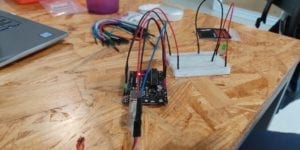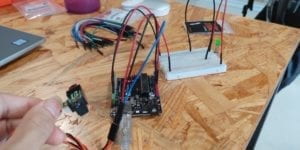In this recitation each team explores a sensor. My teammate chose the old friend of mine: the infra red sensor: previously we use it to control the motion of robot, this time we decided to use the distance signal to control the brightness of LEDs, thought in different expressions, the technology is the same.


However, by having a human control this device there is a level of interaction in it. A simple implementation of this prototype is that: one can deploy it on a car and use the infra red sensor to detect its distance between a wall when parking, when it is too close a warning light on the panel will shine.
We can also apply speakers in stead of LEDs as notification. They are both simple application. A perhaps more advanced design is to build a negative-feedback loop using it, that i, the sensor keep detecting the distance, and there is a threshold X, if distance X it will act to decrease. This type of system can be easily implemented using sensors and actuators, but is widely seen in nature and human bodies.
Besides hardware, we have plenty of time to study the character of Arduino coding. By observing the style I find it is actually C language, perhaps with a few modification. Then I find the function pinMode is perhaps useless, we can delete these lines while having the coding working. Another thing we find is that we must have a setup function, even if we don’t write anything in it. So theoretically the code could be written in this simple way:
void setup() {} void loop() {analogWrite(9, analogRead(A0));}
We shared this code with the group next to us, and they seemed very curious and surprised by this one line coding. Well in practical we wouldn’t write code like this, too hard to read.
As for how computer changed human’s behavior. We will first get the logic chain here: human’s behavior is determined by its consciousness; consciousness is affect by information input through the “sensors”, eyes, ears …. Computers provided new types of imformation human has never seen before. That’s just a general description.
In detail, I happen to be taking commlab at the same time, and the many ideas in the readings this week are actually mentioned in commlab. Whether computers can give mathematical expressions to images or not is not important, modularity is also not important (in terms of affecting people), they do not change the “medium”. Algorithm changes the medium so that the photo’s can move and can make sounds, lights can be changed and people’s face can be beatified.
Automation, variability and all the features are just tools human invented to make the medium achievable. That’s why it is the language of the machine, using the language, we can “code” re medium we want.
As for the result of the change, I’d like to use an example a discussed with my professor in commlab:
“I would like to talk about the failure of U.S. in Vietnam’s war. Many have already know that the U.S. army was not at very inferior situation in the war. It ended abruptly and brought more disaster to Vietnam and U.S. because of the surprisingly strong and irrational antiwar trend in the domestic. This out-of-no-where nationwide antiwar is actually came from satellite TV, the new medium itself. The war broke out not long after satellite TV was widely applied in the U.S. At that time, both the government and the people knows nothing of the new medium’s power. Then the wars broke out, reporters sent back colored photos and videos of the battlefield. It is the first time that the people of U.S., living in peace for years, see the real blood and dead bodies almost in real time. What’s more, in order to catch more eyes, the TV program service providers purposely chose those emotion-triggering pictures and videos: an American solder had his arms shoot off etc. Then, people were shocked and cannot accept the war anymore. They know that the atom bomb killed more, yet they didn’t react on it because no TVs sent them images. On the contrary, if the states government realized the power of the new medium and make use of it, the situation would be different.” (repost from my commlab blog wp.nyu.edu/krischen)